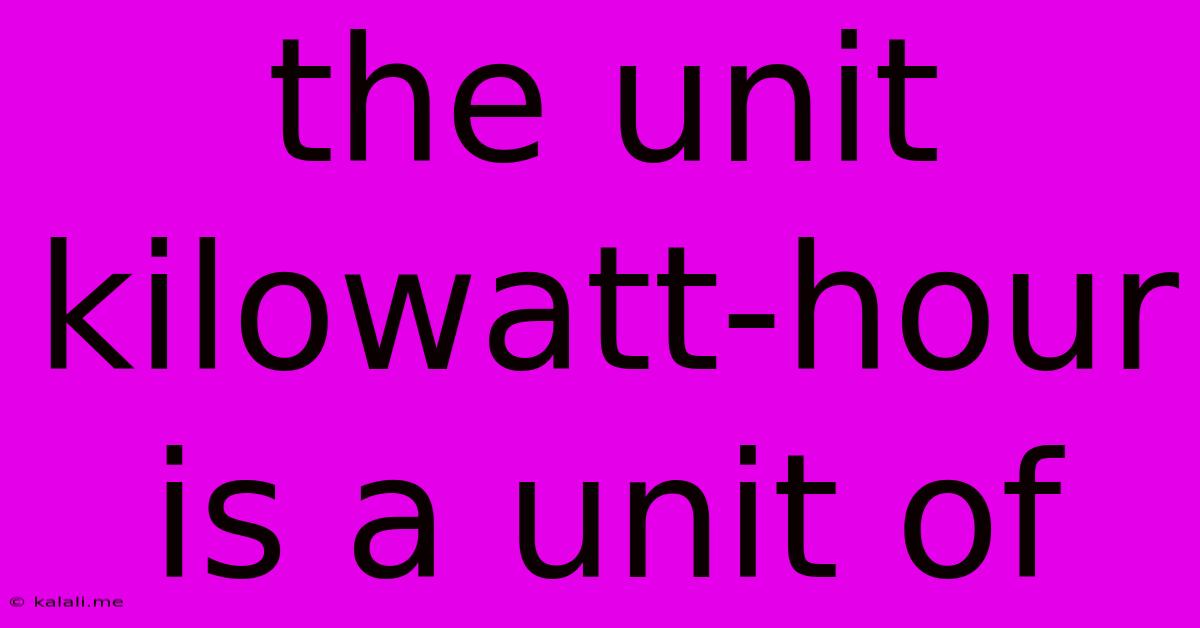The Unit Kilowatt Hour Is A Unit Of
Kalali
Jun 13, 2025 · 3 min read

Table of Contents
The Kilowatt Hour: A Unit of Energy Consumption
The kilowatt-hour (kWh) is a unit of energy. It's a measure of how much energy is used over a period of time, and it's commonly used on electricity bills to quantify household and industrial energy consumption. Understanding what a kilowatt-hour represents is crucial for managing energy costs and promoting energy efficiency.
This article will delve into the meaning of the kilowatt-hour, explaining its components, how it's calculated, and its significance in daily life. We'll also touch upon related concepts like power and its units (kilowatts), helping you grasp the fundamental differences and interrelationships between these crucial energy concepts.
Understanding the Components: Kilowatts and Hours
The kilowatt-hour is a composite unit, combining two fundamental concepts:
-
Kilowatts (kW): This represents the rate at which energy is used or generated. Think of it as the "speed" of energy consumption. One kilowatt is equal to 1,000 watts (W), which is the standard unit of power. A 100-watt light bulb consumes energy at a rate of 100 watts, or 0.1 kilowatts.
-
Hours (h): This represents the duration over which the energy is used. It's the "time" element in the equation.
Therefore, a kilowatt-hour is the amount of energy consumed by a device using 1 kilowatt of power for 1 hour.
Calculating Kilowatt-Hours
The calculation of kilowatt-hours is straightforward:
kWh = kW x h
For example:
- A 1 kW appliance running for 2 hours consumes 1 kW x 2 h = 2 kWh of energy.
- A 2 kW appliance running for 30 minutes (0.5 hours) consumes 2 kW x 0.5 h = 1 kWh of energy.
- A 100-watt (0.1 kW) light bulb left on for 10 hours consumes 0.1 kW x 10 h = 1 kWh of energy.
Kilowatt-Hours in Everyday Life
The kilowatt-hour is a ubiquitous unit in everyday life, primarily seen on electricity bills. Understanding this unit allows you to:
- Monitor Energy Usage: Track your household energy consumption to identify energy-intensive appliances and areas for improvement.
- Compare Energy Costs: Evaluate the cost-effectiveness of different appliances and technologies based on their energy consumption in kWh.
- Reduce Energy Bills: By understanding how much energy different devices consume, you can make informed choices to reduce your overall energy usage and lower your electricity bill. This could involve switching to energy-efficient appliances, using energy-saving light bulbs, and adopting better energy management practices.
- Understand Renewable Energy Production: Solar panels and wind turbines generate electricity measured in kilowatt-hours, helping you understand the amount of clean energy produced.
Kilowatt-Hours vs. Other Units of Energy
While the kilowatt-hour is commonly used for electricity, other units of energy exist, including:
- Joules (J): The SI unit of energy. One kilowatt-hour is equal to 3.6 million joules (3.6 x 10⁶ J).
- British Thermal Units (BTU): A unit often used in heating and cooling calculations.
In conclusion, the kilowatt-hour is a practical and essential unit for understanding and managing energy consumption. By grasping its meaning and applying the simple calculation, you can make informed decisions about energy usage and contribute to a more energy-efficient lifestyle. Understanding energy consumption is a crucial step towards sustainability and responsible energy management.
Latest Posts
Latest Posts
-
What Is The Smallest Functional Unit Of The Kidney
Jun 14, 2025
-
According To Bronfenbrenners Ecological Systems Theory
Jun 14, 2025
-
Which Of The Following Statements Regarding Earthquake Waves Is Correct
Jun 14, 2025
-
5 14 41 No Mans Sky
Jun 14, 2025
-
What Can You Multiply To Get 32
Jun 14, 2025
Related Post
Thank you for visiting our website which covers about The Unit Kilowatt Hour Is A Unit Of . We hope the information provided has been useful to you. Feel free to contact us if you have any questions or need further assistance. See you next time and don't miss to bookmark.